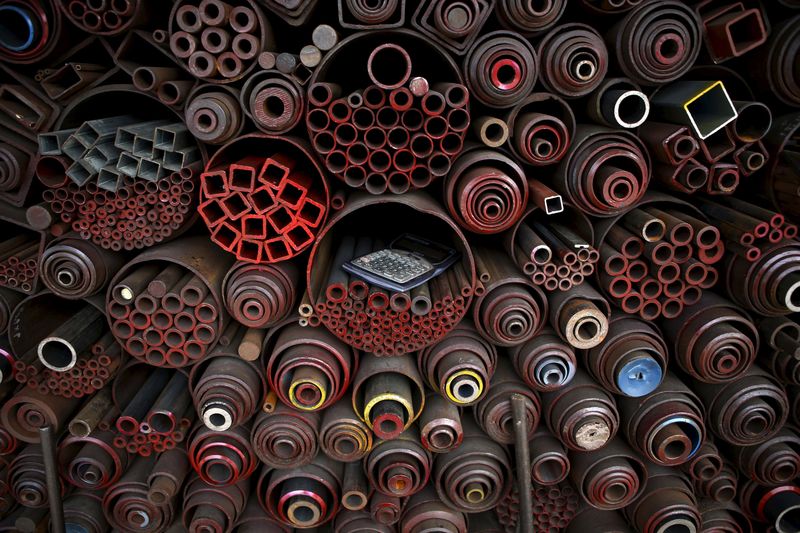(Repeats with no changes to text)
* China steel scrap supply up nearly fourfold last year from 2002
* Aged buildings, clampdown on low-grade steel boost scrap supply
* Iron ore miner not threatened by rising China scrap use
By Manolo Serapio Jr and Muyu Xu
MANILA/BEIJING, July 5 (Reuters) - China's supply of steel scrap is surging as aged buildings, bridges and cars produced over decades of rapid economic growth are knocked down, dismantled or crushed.
That should push Chinese steelmakers to use more of the material in coming years, potentially sapping demand for steel ingredient iron ore from the world's biggest metals consumer.
Faltering appetite for iron ore could hit a critical lifeline for international mining giants which have banked on China continuing to suck up hundreds of millions of tonnes of the most widely traded bulk commodity.
"In the medium to long term, scrap is the real threat to iron ore, for sure," said Daniel Meng, an analyst at brokerage CLSA in Hong Kong.
"We believe by 2020, replacement would become faster and the risk on iron ore from scrap would become more serious."
China currently only produces around 11 percent of its steel from scrap, compared to over 70 percent in the United States, suggesting it may have plenty of room to grow in recycling the material.
The recent abundance of scrap in China followed Beijing's decision to shut mills churning out low-quality steel from induction furnaces - typically big users of scrap - as part of its drive against pollution and a glut in steel supply.
The closure of these mills, with a combined production capacity of 120 million tonnes, helped push the nation's scrap exports to an all-time high in May.
China last year generated a record 143 million tonnes of steel scrap, up nearly fourfold from 2002, data from the World Steel Association and CLSA showed.
That could potentially replace around 200 million tonnes of iron ore, equivalent to about a fifth of China's imports of the commodity last year.
China's steel scrap generation should rise to 200 million tonnes by 2020, the China Association of Metal Scrap Utilization said.
ELECTRIFYING
The bulk of China's steel is produced via blast furnaces where iron ore is melted and later mixed with steel scrap.
As domestic scrap prices ST-SCCNDHV-MB tumbled 20 percent in May from this year's peak, mills increased scrap use in these furnaces to 20 percent from 8 percent, Chinese traders and mills said. But as demand picked up in June, some scrap traders say profits have doubled.
And renewed interest in electric arc furnaces (EAFs), or mini-mills that use only scrap, could fire up demand for recycled steel.
EAFs emit far less carbon than blast furnaces, which use coal as fuel, suiting China's anti-pollution campaign.
"In the long term, I believe the authorities do support EAFs in China," said Wang Guangrui, vice-general manager at Xuzhou Jinhong Steel Group in Jiangsu province, which restarted a 1-million-tonne EAF.
The company first launched its EAF in 2011, but was forced to shut it to switch to a much cheaper induction furnace. It moved back to the EAF after the closure of all the nation's induction furnaces.
Up to 20 million tonnes in EAF capacity may be installed this year, said CLSA's Meng. China's current EAF capacity is around 100 million tonnes and could grow by 10-20 million tonnes a year over the next three years, he said.
Over 60 EAFs will be running in August-October and 20 more next year, said Guo Xianzhen, vice general manager at Anyang Steel Group which plans to launch a 1-million-tonne capacity EAF in September and another 1 million-tonne plant in 2018.
But Australia's Fortescue Metals Group FMG.AX , the world's No. 4 iron ore miner, believes China's iron ore appetite won't wane any time soon, as its scrap supply - usually tied to growth in car ownership - remains low compared to the size of its population.
"Currently, there are more than 700 vehicles per 1,000 people in the U.S. and Australia, with this figure at around 140 in China," Fortescue CEO Nev Power said by email.
"Given the high marginal cost of electricity, the level of scrap contribution will likely be lower overall in China than has been the case in the developed economies," he said.
Top iron ore miners Vale VALE5.SA , Rio Tinto RIO.AX RIO.L and BHP BHP.AX BLT.L declined to comment.
<^^^^^^^^^^^^^^^^^^^^^^^^^^^^^^^^^^^^^^^^^^^^^^^^^^^^^^^^^^^ GRAPHIC on steel scrap in China and elsewhere
http://tmsnrt.rs/2tP7qgS
^^^^^^^^^^^^^^^^^^^^^^^^^^^^^^^^^^^^^^^^^^^^^^^^^^^^^^^^^^^>
